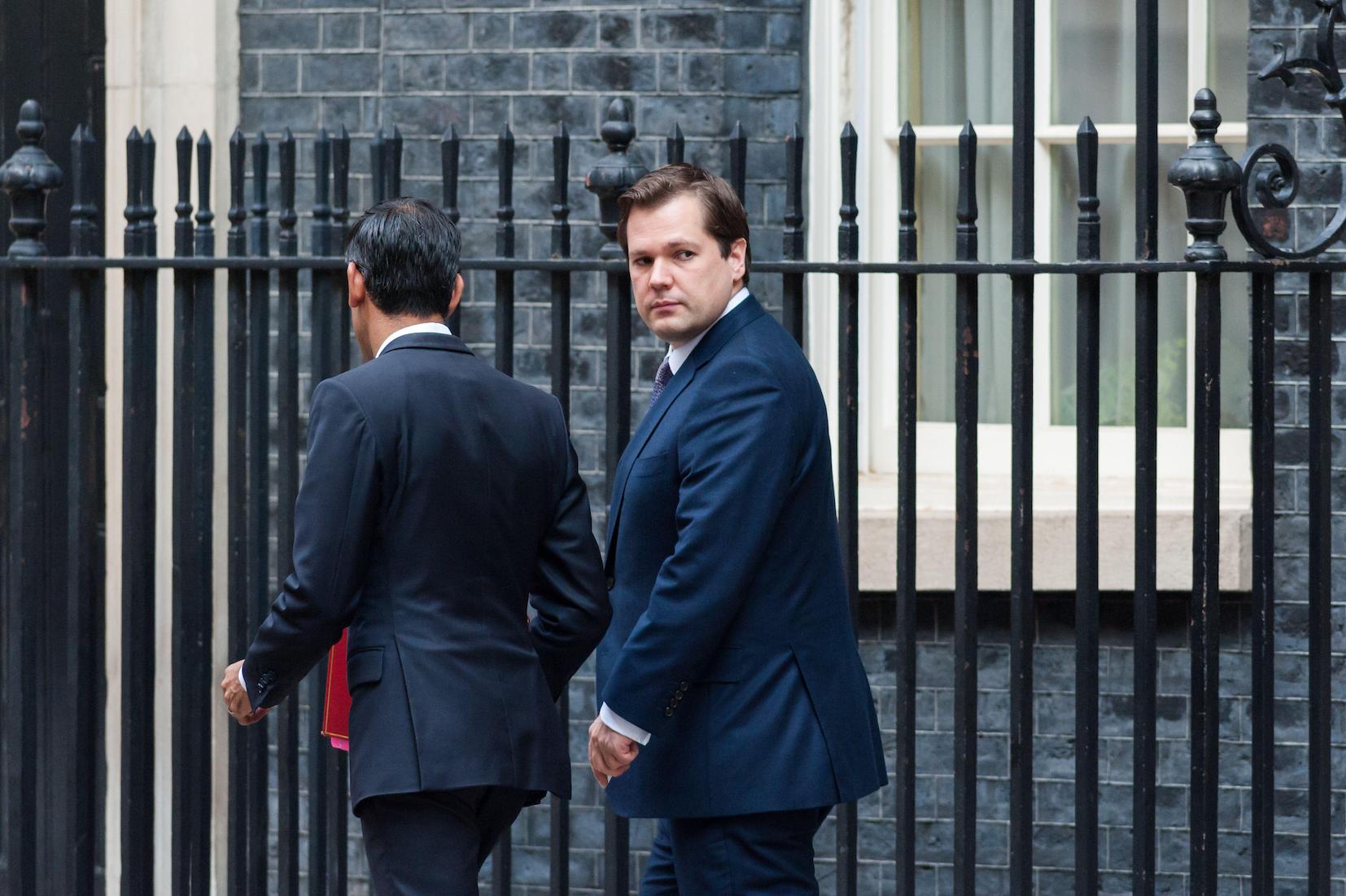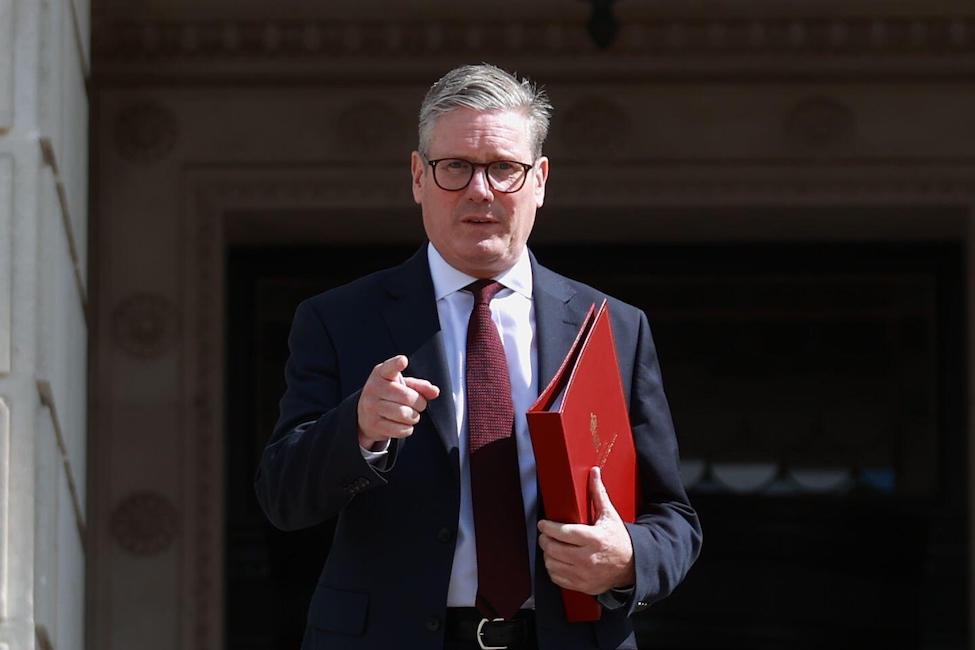Robert Jenrick entered parliament in 2014 after seeing off a challenge from UKIP in a by-election. In such contests, parties tend to pick the most generic, least troublesome candidates after rounds of rigorous vetting. Jenrick, the mild-mannered lawyer, was pointedly prototypical.
In parliament, Jenrick acquired the moniker “Robert Generic” as he climbed the greasy poll briskly if tediously. Somewhere along the way Mr Generic met Rishi Sunak, elected a year after him at the 2015 election; the two formed a close bond.
Then in 2019, Sunak and Jenrick, alongside now-deputy PM Oliver Dowden, formed two-thirds of the triumvirate that co-wrote an article for the Times backing Boris Johnson for the Conservative leadership. It was, and still is, considered a watershed moment: the party up-and-comers — and competent sensible types at that — were swinging in behind Bojo with symbolic synchrony. Under Johnson, Jenrick became housing secretary, performing his cabinet duties with a quintessential lack of colour.
Bounced out of cabinet by the then-PM in late 2021, Jenrick subsequently fell in behind his old ally, Rishi Sunak, in consecutive leadership contests last year. He was rewarded for his loyal support with a return to cabinet — but significantly not as a department lead.
Instead, he would serve as minister for immigration, deputising for right-wing firebrand Suella Braverman. The Home Office was roundly judged to have been surrendered to Braverman as part of a pre-accession pact with the wannabe PM. At the time, as Conservative MPs fumbled for a replacement for Liz Truss, it was an act of relative elegance. Two former opponents had agreed to put their differences aside in favour of mutually assured career development: an ultimate marriage of convenience.
But the pact would have political consequences, that was plain to see. And in this light, the appointment of longtime loyalist Jenrick as the cabinet-attending Home Office No 2 was immediately interpreted as Sunak constraining Braverman’s power and influence. Rather than let his new home secretary craft a semi-autonomous institutional power base in government, in slotted Jenrick. The immigration minister, on these terms, emerged as a crucial component of the PM’s political operation.
Thus, as the salience of migration increased with a new pledge and new legislation, Jenrick’s profile raised in turn. But more than this: at every stage it was the immigration minister — not Braverman — who was entrusted with the Home Office’s trickiest parliamentary and media assignments. He amped up the “vice-signalling” as Mickey Mouse murals were painted over and his rhetoric hardened.
In this way, for a period, it seemed like Sunak’s strategy was working. Jenrick emerged as the de facto home secretary as Braverman quieted. Sunak’s gambit had, seemingly, paid off.
But what did Jenrick make of the dynamic? His apparent rhetorical sops to the Conservative right did not change his characterisation as Sunak’s moderating manager in the Home Office. His net satisfaction rating among Conservative members tumbled over time, reaching — in his last Conservative Home cabinet ranking as immigration minister — a dire -8.9 points.
Ultimately, contextualising Jenrick’s evolution from Sunak lackey to darling of the Conservative right poses all kinds of analytical problems. But what seems clear is that it happened quickly.
That takes us to reshuffle day: 13 November 2023.
Suella Braverman was sacked and the post of Home Office lead was left wide open. Perhaps Jenrick thought it should have been him tasked with filling the void, having acted as no less than de facto home secretary for so long. Did that not warrant a de jure promotion?
But with Lord Cameron vaulted into the Foreign Office, James Cleverly was subsequently slid across. It came ahead of a crucial period for the department as the Supreme Court’s ruling on the Rwanda and the release of net migration figures loomed.
Soon, following the Supreme Court ruling on 15 November, it was reported that Jenrick was firmly behind “four of the five points” that comprised Suella Braverman’s “Plan B” proposals. It came after Cleverly’s first interview as home secretary by the Times revealed the new department chief did not consider the Rwanda scheme the “be all and end all” of the government’s “stop the boats” agenda.
Already, a discursive chasm was opening between new Home Office lead and deputy.
Next, in the wake of the publication of new legal migration figures, Jenrick was said to have sent a five-point plan to Downing Street. In light of recent events, it can be viewed as Jenrick’s first ultimatum, and the Daily Mail reported the immigration minister as being on “resignation watch”. Still, the suggestion was largely dismissed — Jenrick is a Sunak poodle, right?
But the immigration minister leaned into the reports. He told the commons last Monday that there were “strong arguments” for an absolute cap on the numbers of immigrants allowed each year, adding: “There are definitely strong arguments for using caps, whether in general or on specific visas — but these are conversations that we need to conclude within government”.
It had become clear: Jenrick was now filling the Braverman-shaped hole in the Home Office by putting himself at the head of demands in the Conservative Party on migration, legal and illegal.
The former immigration minister’s resignation yesterday shows just how seriously he is taking this self-assumed role. Indeed, he is willing to cause the prime minister, a longtime friend, considerable political pain to pursue this path.
But what else does it reveal? Yesterday, as the news filtered into the commons chamber as Cleverly delivered a statement on the new Rwanda bill (with Jenrick conspicuously absent), it was viewed as immediate evidence that the Conservative right would not be throwing its weight behind the legislation.
In his resignation letter, Jenrick made clear he wanted to bypass the European Court of Human Rights, labelling the bill “a triumph of hope over experience”. And, in the minutes before the former immigration minister signed off his goodbye missive to Sunak, chair of the European Research Group of Conservative MPs, Mark Francois, told the commons the reports Jenrick had resigned are “deeply worrying”.
Significantly, Francois’ ERG — along with a constellation of other Conservative right caucuses — has deployed a “star chamber” of lawyers to unpick the new Rwanda legislation. It is likely that when this group reports, in a throwback to the Brexit tumult of 2018, associated MPs will say they are unable to support the bill.
This would be a dire situation for the PM. We have already seen his government lose a House of Commons vote this week — and now the next could be just around the corner on a far more politically potent issue. In any case, Sunak will want a significant commons majority in order to stare down the Lords in any potential parliamentary “ping pong” to follow.
Fighting back, reports suggest Sunak could treat the coming commons vote as a confidence issue. It is analogous to how Boris Johnson treated votes on his Brexit deal in 2019 — or, to take what might be a more worthy comparison, how Liz Truss intended to treat the opposition day motion on fracking in the dog days of her premiership.
In fact, in treating the vote as a confidence issue, Sunak may merely be inspiring more agitated MPs to send in their letters to the 1922 committee.
There is another question: how will Robert Jenrick feature in the tumult to come? With his resignation, he has essentially confirmed he will vote against the bill — taking much of the Conservative right with him in the process.
In the end, the only political pathways that lay ahead for Rishi Sunak point to deepening, crippling political turbulence. “Unite or die”, Sunak told his MPs yesterday — what is for certain is that sustained intra-Conservative hostilities will only further damage the PM’s dire electoral prospects.
‘Now or never’: Braverman says Conservative Party faces ‘electoral oblivion’ if Rwanda bill fails
Josh Self is Editor of Politics.co.uk, follow him on Twitter here.
Politics.co.uk is the UK’s leading digital-only political website, providing comprehensive coverage of UK politics. Subscribe to our daily newsletter here.












